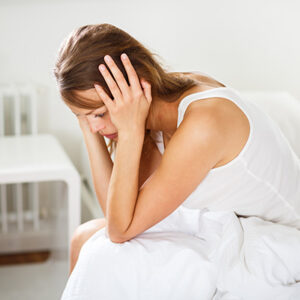
1. Stress Type Headache (Liver Qi stagnation Headache)
Stress-type headaches are caused by the dysfunction of the autonomic nervous system. The stress of daily life continuously stimulates and excessively increases the tension of the autonomic nervous system (TONE). This is called a common tension headache.
Symptoms
- Chest discomfort (breathing frequently, chest tightness, and occasional chest pain)
-Emotional changes (susceptibility to depression, anxiety, anxiety, impatience, and irritability) - Sleep disorders (insomnia, difficulty falling asleep or waking up in the middle of the sleep. Frequent occurrence of dreams)
- The neck and shoulders are heavy and stiff (the neck and shoulders are easily tired and feel as if a bear is sitting on the shoulder).
- Hot flushes (Even if the face is red, the heat gets hot with the head and the skin turns red even with mild skin irritation.)
- Bloated stomach, difficulty with digestion, and bowel movement problem.
2. Stomach Type of Headache (Phlegm type)
Frequent digestive problems and headaches with dyspepsia.
Symptoms
- Frequent motion sickness or nausea upon using a toothbrush.
- Common cold medicine, painkillers, antibiotics can cause heartburn and cannot be taken for a long time.
- Tonsils are prone to swelling when catching a cold.
- Weak stomach and sensitivity to odor.
- Indigestion triggered by emotional tension
- Frequent borborygmus.
3. Respiratory type of headache
Caused by insufficient oxygen supply due to chronic rhinitis or respiratory diseases such as sinusitis.
Compared to a typical headache, the patient feels more head fogginess, difficult to wake up early in the morning. Commonly occurs with students preparing for college entrance exams.
In the case of sinusitis, pain may appear on the face and forehead.
Hypothermal Type (Deficiency heat type/ Coldness type)
4. Deficiency heat type headache
Cold hands and feet while the head remains hot. This is because of bad blood circulation that does not extend well to the extremities but rises to the upper body.
Symptoms
- Prone to fatigue. Low stamina. The hands and feet are cold, and the patient likes to avoid the air conditioner or fan.
- The air conditioner and fan can cause a headache.
- When getting tired or stressed, the hands and feet are colder, and the face becomes red.
- The patient has a habit of drinking coffee in the morning.
5. Coldness Type
The tightening muscles around the neck cause a headache. Because the body temperature is low and sensitive to the cold, the muscles are easily tightened as a result of the habitual contraction of shoulder muscles.
Symptoms
Unlike the rebellious Qi type, hands, feet, and face all remain cold. This type of patient likes to wear a hat in winter because it causes a headache after exposure to cold weather for long hours. Hands and feet are cold in winter and the patient tends to sleep with sleeping socks. Fingers and toes can be very cold or prone to frostbite if the patient engages with outdoor activities in winter. Sometimes eating ice or cold food can cause stomachaches or diarrhea.
6. Migraine Type
This type of headache is caused by the stimulation of the cranial nerve. As a result of tension and contraction of the basal blood vessels, vascular dilation occurs, stimulating the cranial nerve.
Symptoms
- This headache is accompanied by nausea and vomiting like migraines.
- It is often accompanied by eye pain.
7. Blood Stagnation Type
Increased blood viscosity leads to circulation disorders and leads to headaches.
Symptoms
- Mostly, they tend to be constipated.
- Women often have dysmenorrhea or menstrual irregularities and are prone to bruising.
8. Damp and fluid accumulation type headache
Caused by fluid accumulation, lymph circulation disorders, and circulatory disorders of cerebrospinal fluid.
Symptoms
- Unlike common headaches, the patient feels fogginess, heaviness, and stiffness in the head instead of pain.
- It often accompanies dizziness.
- Urinating only 4 to 6 times a day with a likelihood of urination disorder.
- Waking up because of urine during sleep.